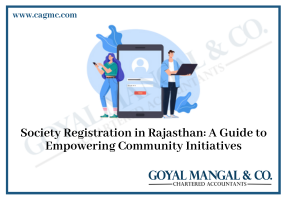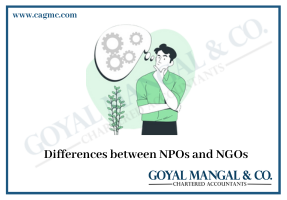
Charity means helping the needy. The help can be done in cash or kind depending on the need of the person you want to help and resources available with you. Charitable Trust, NGOs appeared as a big help in the recent times when world is fighting COVID-19 pandemic. If we give donations, we get deduction under Income Tax Act as per applicable conditions. However, have you ever thought what is tax treatment of these donations in the hands of Charitable Trust or Organisations receiving it. Well in this article our scope of discussion will be the same.
| Table of Contents |
Meaning of Charitable Trust
Income tax Act has not defined the term Charitable Trust, but in general terms Charitable Trust means an organisation set up for religious and charitable purpose.
Charitable Purpose– Act defines charitable purpose as any work done for-
- Relief of the Poor
- Medical Relief and Education
- Yoga
- Preservation of Environment, Monuments and places/objects of artistic or historic interest.
- Advancement of any other object of General Public Utility. In this case, it will not be treated as a charitable purpose if it is being carried out in form of trade and commerce in exchange of a consideration. Law also states that application of such income will also not make it a charitable purpose until and unless these two conditions-
- If it is done in actual course of providing such object of general public utility
- Receipts are <20% of total receipts during previous year
Religious Purpose– Act does not define the term religious purpose. But in general understanding religious purpose means practising, advancement and pursuing any religion.
Procedure for Registration of Trust
The procedure for formation of a Charitable Trust is given in the act. If a trust wants to claim exemptions under Sec.11, than it is mandatory for the trust to get registered. A charitable trust needs to fill Form 10A for registration.
The form requires details like,
- Nature of trust and objects for which it is established
- Type of entity and Registration details under Income Tax Act or any other Act.
- Certain details about financials of the company.
- The authorised person who can be any one of author, trustee, founder, Director of Company, Members of Society.
The documents to be submitted along with Form 10A are-
| Condition | Document Required (Self- Certified Copy) |
| 1. If established under an instrument | Copy of such Instrument |
| 2. If established otherwise than an instrument | Document evidence for creation of trust |
| 3. Company/ Firm/Society/Public Trust | Certificate of registration from Registrar of Companies/Firms/Society/Public Trust |
| 4. For objects of the Charitable Trust | Documents for adoption or modification of the objects |
| 5. Annual Accounts | Annual accounts for up to 3 Financial Years prior to application for registration |
| 6. Already have a order for registration | Copy of such order |
| 7. Already have an order for rejection | Copy of such order. |
Concept of Income and Application thereof
The money received by a trust can be held in two ways-
- Corpus Fund- Just like capital or reserve funds for any entity.
- Non Corpus- For day to day utilisation of funds to work towards the object.
The sources of income of a Charitable Trust mainly include-
- Income derived from property held under trust wholly for charitable and religious purpose.
- The major source for incoming funds, in case of a charitable trust is donations. Donations also form a part of income.
This money is then spend for Charitable or Religious purpose. In case of trusts spending of money is called “Application”. Now, law has provided clearly as to what will constitute application and what will not. Gross Receipts net of the allowed application will be levied to tax subject to exemptions.
Now, we will briefly discuss the meaning of application-
- Revenue and Capital Nature- If the purpose of use is charitable/religious then both revenue and capital nature of expenses can be claimed as exemption.
- Repayment of Loan- Loan is an external fund that is ought to be repaid so the application of money from loan amount will not be allowed in year of application, but will be allowed in the year in which such loan is repaid.
Recent Amendments by Finance Act-2020 and 2021
- Finance Act, 2020: If a charitable trust registered u/s 12AA wants to donate certain amount or funds to an educational or a medical institution registered u/s 10(23C) then same will not be treated as application.
- Finance Act, 2021: If the past deficit is set-off against current year’s income then same will be excluded while computing 85% application. In case where the charitable trust has applied funds from corpus than same will not be treated as application until it is deposited back to corpus by way of specified investments for trust.
Income Tax Exemptions available to Trust
The aim of charitable trusts is to work for the betterment of the society, which is the reason Income Tax Act has extended benefit of various exemptions to the charitable trusts.

Other than this normal provisions of the act will apply to charitable trust. In case a trust is found not carrying out its operations as per its declared objects or misusing the provisions of the act or services of the trust for specific persons (in case of educational and medical institutes) than it will not be allowed to claim exemptions.
Now, what happens if a trust is not able to apply 85% of its income, act also gives solution to this problem-
- Income is accrued and not received- In this case, charitable trust can file the option of applying such income in upcoming year.
- Income could not be used for purpose declared earlier- The charitable trust can give option to opt for accumulation of such funds for 5 years. The said funds should be applied within 5 years or otherwise it will be taxable. Also during 5 years the funds should be invested in specified options.
The required forms should be filled and submitted to avail these options under the act.

Return Filing of Charitable Trust
Now, after the Charitable trust has arrived at its income than it should pay tax, if any, and file its return.We will discuss applicable tax rates, ITR Forms and due dates-
| Tax Rates applicable to a Charitable Trust | Slab rates for Individual ( age up to 60 years) | |
| Surcharge | Income between Rs50 Lakhs-Rs.1 crore | 10% |
| Income more than Rs.1 crore | 15% | |
| Education Cess on Income tax and surcharge | 4% | |
Now, a charitable trust can file return in following ITR-Forms
- ITR-5 – This form can be used if the trust is not required to file return in ITR-7
- ITR-7- This form is used by certain category of assesses who are required to file their return of income under section 139(4A) or section 139(4B) or section 139(4C) or section 139(4D).
Persons covered under above sections mainly include:-
- Section-139(4A) – Person having income from property used for charitable/ religious purpose or if such property is held under legal trust or obligation.
- Section-139(4B) – This section covers political parties.
- Section-139(4C) – This covers association conducting scientific research or news agency etc.
- Section-139 (4D) – Schools, Colleges and Institutions etc.
The charitable trust should file the return electronically. The trust who is required to submit its audit report should file the return with digital signature.
The due date for filing return are as follows:-
| Particulars | Date |
| If audit is to be done under Income Tax Act or any other law | 31st October of the AY |
| If required to submit Form 3CE, i.e. Report from CA if entered in an International Transaction | 30th November of the AY |
| In any other case | 31st July of the AY. (Extended to 30th September,21 for AY 21-22) |
Conclusion
To conclude we can say that as Charitable Trust are making the lives of needy better so act has provided enough incentives to these trusts. In this article we discussed about Charitable Trusts from Income Tax perspective. If law has provided facilities, it also contains penalties for misusing the provisions. Taxation of charitable trust is simple, but the tricky part is to calculate income as application of income and exemptions available should be done very carefully. So, it is always better to take assistance from your consultant so that payment of tax and filing of return is done correctly.







